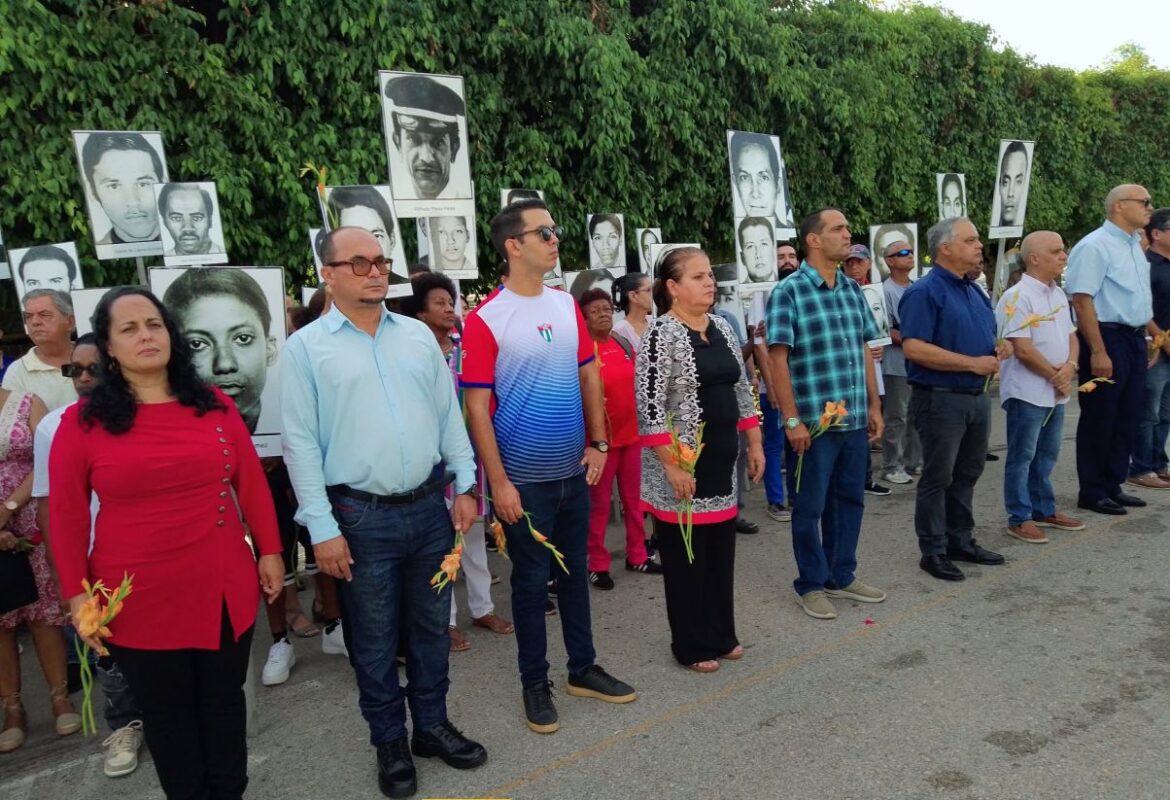Floral offerings on behalf of Army General Raúl Castro Ruz, leader of the Revolution, and Miguel Díaz-Canel Bermúdez, First Secretary of the Central Committee of the Communist Party of Cuba and President of the Republic, led the pilgrimage to the Pantheon of the Revolutionary Armed Forces at the Colón Necropolis on Monday, in commemoration of the Barbados Crime that occurred 49 years ago, according to the Facebook pages of the Ministry of National Unity (MININT) and several other institutions.
The event was attended by Liván Izquierdo Alonso, First Secretary of the Communist Party of Cuba in Havana, and Yanet Hernández Pérez, Governor of the capital, both members of the Central Committee, along with Osvaldo Vento Montiller, President of the National Institute of Sports, Physical Education, and Recreation, representatives of the Union of Young Communists, the Ministry of Transportation, families of the victims, and a broad representation of the public.
Jorge Luis Fajardo Casas, Secretary General of the National Union of Food Industry Workers, delivered the keynote address and recalled those who fell on October 6, 1976, in which he also denounced the history of terrorist actions organized from U.S. territory and Cuba’s inclusion on the unilateral list of countries that allegedly sponsor terrorism.
The union leader recalled that every October 6th, the Day of the Victims of State Terrorism against Cuba is commemorated, in honor of the 3,578 deaths and 2,099 disabilities caused by this scourge.
During the ceremony, those attending reaffirmed their irrevocable commitment to the homeland and laid flowers in the graves holding the remains of the victims of the sabotage of Cubana de Aviación Flight 455, which claimed the lives of 73 people, including 57 Cubans, 11 Guyanese, and five citizens of the Democratic People’s Republic of Korea.
Among the victims were 24 members of the Cuban youth fencing team, who were returning to the country after participating in the Central American and Caribbean Championship. The incident became one of the most painful and abhorrent terrorist acts in the country’s history.
Cuba has maintained a firm stance in the fight against international terrorism. The 2019 Constitution establishes in its Article 16 the condemnation of this scourge, and the current Penal Code defines the crimes related to its financing and execution.
The country is a State Party to 18 international treaties against terrorism and has complied with United Nations Security Council resolutions, such as 1267, 1373, and 1540, among others. Furthermore, in 2018 it signed the Code of Conduct towards a world free of terrorism.
At the domestic level, judicial and police cooperation mechanisms, as well as border and financial control, have been strengthened, which has prevented the national territory from being used for illicit operations.
The results of this policy are reflected in Cuba’s absence of links to the organization or financing of terrorist acts against other countries, and in its active participation in multilateral forums that promote a comprehensive and non-selective approach to the fight against this scourge.
Cuba denounces that it is the victim of political manipulation by the United States government, having been unilaterally included on the list of countries that allegedly sponsor terrorism, despite its history of international cooperation and the signing of 18 global treaties on the matter. This constitutes an act that ignores the truth and seeks to justify measures of economic and diplomatic pressure against the island.
[ SOURCE: AGENCIA CUBANA DE NOTICIAS ]

